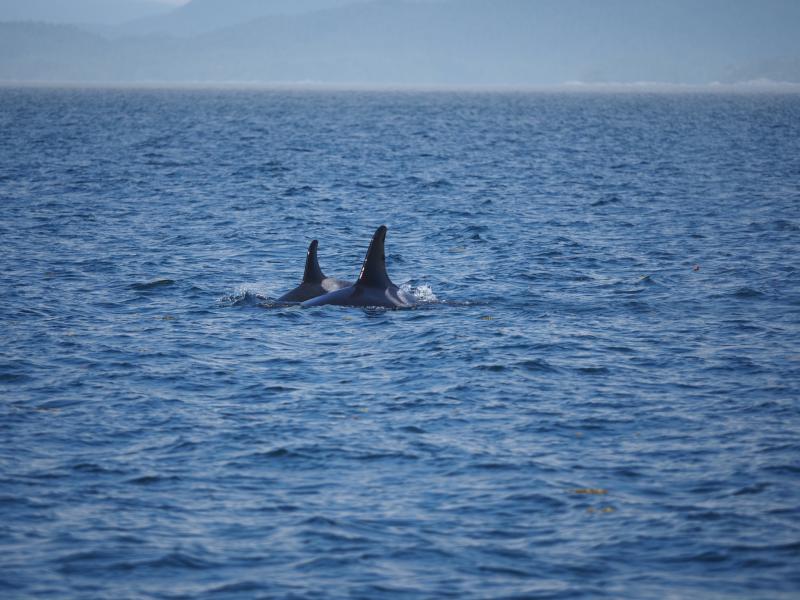On January 14, 2002, the public sighted an orphaned, juvenile Northern Resident killer whale in Puget Sound. She was nicknamed Springer, and was the first killer whale calf to be rescued, rehabilitated, and released. Springer was reunited with her family in British Columbia on July 15, 2002. Almost 20 years to the day of her release, Springer made an appearance, much to the delight of those who gathered at a reunion celebration.
On July 21, 2022, Dr. John Ford, a retired Canadian Department of Fisheries and Oceans scientist photographed Springer (A73), who is now a mother. She was seen with her two calves, Spirit (A104) and Storm (A116). He noted they looked to be doing well. Dr. Ford saw the whales on his way to Telegraph Cove, B.C, to attend a celebration of the 20th anniversary of Springer’s rescue operation.
Members of the team that rescued Springer gathered at the Whale Interpretive Centre on July 23, to tell Springer’s story and answer questions from the public. Joe Scordino, now retired from NOAA Fisheries, highlighted the challenging decision-making process involved. He acknowledged the crucial roles played by all of the partners and the public. Dr. Brad Hanson, the lead for NOAA Fisheries Northwest Fisheries Science Center research program for endangered Southern Resident killer whales, emphasized what we learned from the rescue. “The techniques and expertise developed for Springer’s rescue have helped us respond to other ailing whales, such as the emergency response we did for J50 a few years ago,” he said. “While we weren’t able to save J50, we continue to learn about the whales’ health to inform our recovery program and it all started with Springer.”
Partnerships Key to Whale Recovery Success
“Springer’s success story continues to be an inspiration for all of us working on conservation in the Salish Sea,” said Lynne Barre, the lead for orca recovery at NOAA Fisheries’ West Coast regional office in Seattle. “The partnerships created during Springer's rescue provide a strong foundation for international cooperation as well as coordination between government, state, tribal, and non-profit groups to benefit both Northern and Southern Resident killer whales.”
Donna Sandstrom was a key partner in Springer’s rescue, organizing multiple non-profits into the Orphan Orca Fund in 2002. That effort enabled the public to donate critical medical and rescue supplies. She co-organized the reunion event with Mary and Jim Borrowman from the Whale Interpretive Centre. She is the director of The Whale Trail, a collaborative project inspired by her work supporting Springer’s rescue. Donna is now the author of a new book about Springer, titled Orca Rescue! “Springer’s reunion is the only project of its kind in history,” Sandstrom said. “Her continued success gives us hope, and inspires us to approach issues facing orcas today with the same commitment, urgency and resolve.”
Event Celebrates Springer’s Rescue
The Whale Trail also hosted an event in the United States in July to share Springer’s story. As part of the West Seattle Summerfest, Donna and members of the rescue team delighted kids with first-hand details about the rescue. There was an orca scavenger hunt, and the chance to pose for photos with one of the sticks that Springer used to rub on in Puget Sound. Students and their families also had the chance to tune into an in-person and virtual event hosted by Bellamy Pailthorp, KNKX Public Radio, to learn about Springer and the 20-year milestone. The KNKX Springer Event included remote participation by Enest Alfred from the Namgis First Nation, who was there in July of 2002 to welcome Springer home to B.C. waters.
The smiles at these events were unmistakable—from the rescue team, who still find it hard to believe everything came together 20 years ago, to the kids hearing Springer’s story for the first time. “When we show the video clip of Springer swimming out of her net-pen and reuniting with her family, it always gets a round of applause, celebrating the team's hard work and Springer’s resilience,” observed Lynne Barre. She enjoyed participating in all of the reunion events this year. “The recent photos of Springer with her calves also get a cheer and inspire hope. It was amazing that she showed up right on time with her family for the 20th anniversary.”





